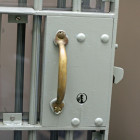
The Supreme Court decision to ban life without parole for children in all cases except murder affects 37 states with laws on the books, including Georgia. But it does not appear that any Georgia inmates are candidates for release at this time. The ruling reversed a life without parole sentence for Terrance Graham, a Florida man who was 17 when he committed a home invasion robbery, just six months after another robbery. As the Miami Herald reports, the high court agreed he belongs in prison, but said, “it does not follow that he would be a risk to society for the rest of his life.''
An analysis in the Christian Science Monitor cites studies showing young people are less able to assess risk, control impulses, and process consequences. Justice Kennedy wrote that they are also more capable of change. Cutting off that possibility amounts to cruel and unusual punishment, violating the Constitution’s Eighth Amendment. Seven states already ban life without parole for juveniles. Eleven more statesare considering similar laws.









